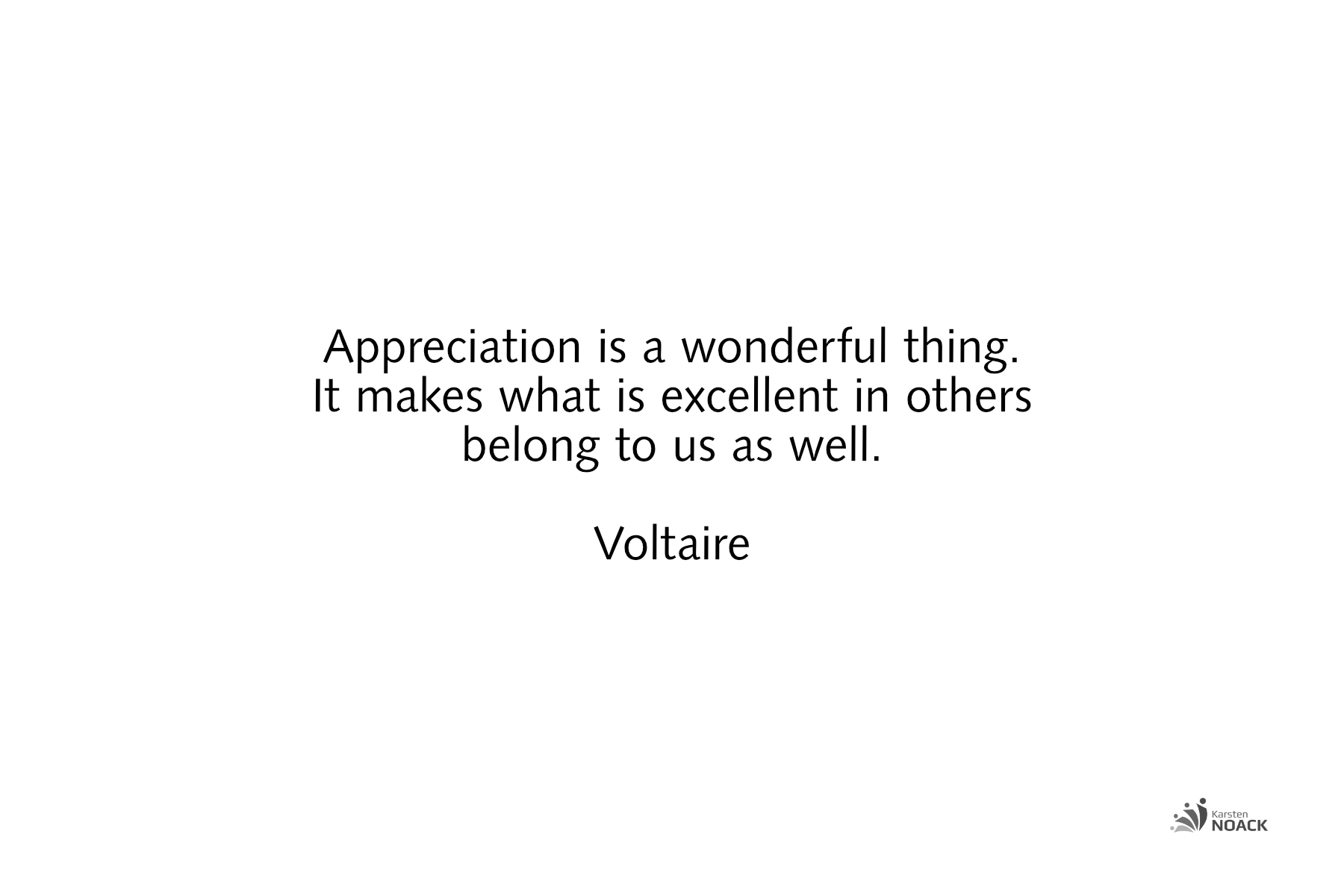Do you believe your vision is too huge and long term? Stay with it, because when we take action in the right direction we truly experience life.
The importance of showing appreciation: 10 good reasons to show appreciation
The Importance of Showing Appreciation: 10 Good Reasons To Show Appreciation
Why appreciation matters so much.
Showing appreciation to other people
We all need to know that we’re important in other people’s lives. Humans need to be noticed and valued — in private and business life. Why do I believe that it is so important to show appreciation? Because…
Overview

Why appreciation matters so much
At least in Germany, the term “appreciation” degenerates into a buzzword; today it is used inflationary and is seldom meant honestly. Although appreciation is often confused with praise and recognition for achievements, real appreciation goes much further. It regards colleagues as human beings who are valuable because of their abilities, personality, and uniqueness. Regardless of their position in the company, each employee has enormous potential in different areas.
Respect, recognition, and benevolence are a part of how we show appreciation. Appreciation is characterized by interest, attention, devotion, and friendliness.
Appreciation is a fundamental human need in both professional and private life. We want to be appreciated by what we are, what we do, and what we achieve. We all need to know that we’re important in other people’s lives. And we need to feel that we are appreciated — in private in business life. It doesn’t matter whether your office is a boardroom, classroom, or anywhere else. We all want to be noticed and valued. Appreciation is at the core of all healthy relationships. Most of us feel like we don’t get enough appreciation. Did you know that one of the main reasons people leave their jobs is because of a lack of appreciation? It’s demoralizing when you’re not recognized for your efforts and skills. There are a lot of people who do things for you every day. Employees, colleagues, family, and friends are expected to do their part. Do they know that you appreciate them? Let others know that you appreciate them.
Why do I believe that it is so important to show appreciation? Because…
Appreciation is powerful. 10 good reasons to show appreciation
Appreciation is the act of giving something or someone their proper value, and everybody has value. The value in a relationship is important because it lets a person know where they stand, and what they mean to you; appreciation is a way of letting that person know what you value. There are plenty of powerful benefits to the recipient and giver as well. Here are a few examples.
Apply appreciation to your relationships in business and private life and you will…
1. … make other people happy.
Appreciation is a fundamental human need in both professional and private life. We want to be appreciated by what we are, what we do, and what we achieve.
2. … make yourself happy.
When you express your appreciation for someone, you will not only improve their lives but yours as well. You will feel more fulfilled because you have done something to make someone else’s life better. It will change your mindset. Our mood and daily outlooks change when we focus on positive things rather than negative.
3. … boost moral.
Appreciation boots moral. It has the largest effect on trust when it occurs immediately after a goal has been met, when it comes from peers, and when it’s tangible, unexpected, personal, and public.
4. … motivate others.
One of the easiest and most effective ways to motivate others is by appreciating them. When you praise or appreciate someone, it indicates that you have recognized their effort. It may encourage them to go the extra mile. Giving recognition inspires greatness in others.
5. … build trust in relationships.
Gratitude makes us nicer, more trusting, more social, and more appreciative. As a result, it helps us make more friends, deepen our existing relationships, and improve our marriage. Those who express appreciation with others are more committed to them and more likely to stay in the relationship.
6. … show respect.
Respect is an essential ingredient for healthy relationships.
7. … deepen your relationships.
When you look for the good instead of the bad in the surrounding people, you begin to notice just how interesting they are. You will engage at a higher level. It will accelerate the relationship-building process and enhance their overall impression of you.
8. … see more clearly what counts.
Your focus change and will be more positive.
9. … see more innovative results.
Employees who recognize their team members experience a huge increase in innovation.
10. … increase your effectiveness.
Giving appreciation has a direct impact on results. For example; employees who give or get appreciation experience a huge increase in work results.
How?
Go ahead and thank someone for something they’ve done for you. It costs you so little, but it might mean the world to the other person.
%
Rare to never
%
Just enough
%
Often
Result of a non-representative survey on www.karstennoack.de and among participants attending events of NOACK Training & Coaching Berlin (n= 633)
Appreciation within the company I work for is…
%
rarely meant seriously.
%
usually meant seriously.
Result of a non-representative survey on www.karstennoack.de and among participants attending events of NOACK Training & Coaching Berlin (n= 645)
What can a company do to value its employees?
Companies that are serious about appreciation should consistently live the values they share. Unfortunately, this is rather the exception! All the more gratifying that some of my clients are willing to take this step. All too often, it’s all about declarations of intent.
And how can I express to my colleagues that I appreciate them?
Speak out what is valued about each other. Small gifts maintain friendship; whether verbal or quietly, sometimes symbolically tangible. Even an honestly meant smile can speak volumes. And undivided attention, as natural as it should be and yet is not, is also a precious commodity.
Preparation of important conversations and negotiations
Communication can be very easy. But often it is not. Sometimes we say things and then later notice from the reaction of our conversation partners that they seem to have spoken to someone completely different. I didn't say that with the best will in the world. - Or did I say that after all?
More or less consciously, conversations are about convincing other people of something - be it a special offer, your personality, a perspective, or a necessity. If this doesn't happen fast enough and above all not exactly to the point and descriptively, the person we are talking to quickly loses interest, and we lose the hoped-for opportunity. — Conversation failed.
You can let me support you in the preparation of your conversations and negotiations (to be on the safe side: no legal advice!). Find out how you and your message are perceived (arguments, body language, language, voice, and much more). I will familiarize you with effective tools and communication strategies. Develop your psychological skills, learn to stay calm, act confidently, remain authentic, and finally convince.
Just ask me personally
Please post any questions that may be of interest to other readers in the comments. Looking for professional help?
If you are interested in coaching, training or consulting, if you have organizational questions, or if you want to make an appointment, you can reach me best via this contact form (you can choose if you want to enter your personal data) or via e-mail (mail@karstennoack.com). You can also reach me by phone at +49(0)30 864 213 68 or by cell phone at +49(0)1577 704 53 56 from Monday to Thursday from 9:00 to 18:00. Most of the time I am in sessions, so please leave a message with your phone number in Germany. Please remember to be very specific about the reason for your call. I will get back to you as soon as possible. The privacy policy can be found here.
Transparency is important. That is why you will find answers to frequently asked questions already here, for example about me (profile), the services, the fees and getting to know me. If you like what you see, I look forward to working with you.
Message
Remarks:
In the address bar of your browser, the URL should begin with "https://www.karstennoack.com/...". This indicates a secure connection (SSL). Whether you enter your real name is up to you.
Is this vision too huge and long term?
You need a vision and here is how with step-by-step guide incl. vision board
This guide provides step-by-step instructions on how to craft a compelling personal vision. There are a few essential steps if you want to design a powerful vision. And how about a vision board?
Do you have a mentor?
Almost every successful leader had a mentor. What is important to keep in mind, what makes a good mentor? Learn how a mentor can support you.
Are you a hero or a mere dreamer? Start doing and stop dreaming.
Dreaming is a good starting point for a challenging journey. But dreaming isn’t enough without actions. Wishful thinking is hoping for something and waiting for someone else to make it happen. Be a hero, because we need a lot of them!

This article is a short excerpt from the more comprehensive course materials my clients receive in group or individual training or coaching.
Published: March 21, 2001
Author: Karsten Noack
Revision: May 15, 2021
Translation: ./.
German version: https://www.karstennoack.de/wertschaetzung-unternehmen/
K:
H:
T: RR
#1652282